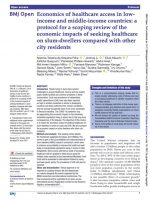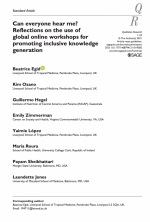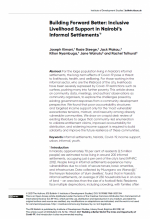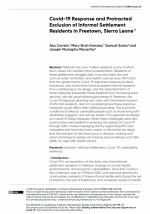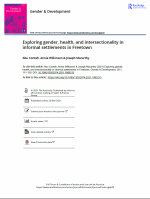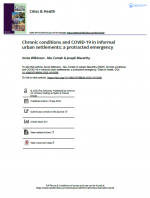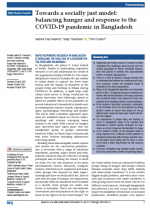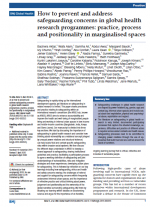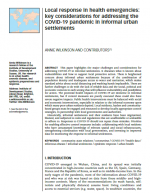People living in slums face several challenges to access healthcare. Scarce and low-quality public health facilities are common problems in these communities. Costs and prevalence of catastrophic health expenditures (CHE) have also been reported as high in studies conducted in slums in developing countries and those suffering from chronic conditions and the poorest households seem […]
Online research methods have risen in popularity over recent decades, particularly in the wake of COVID-19. We conducted five online workshops capturing the experiences of participatory health researchers in relation to power, as part of a collaborative project to develop global knowledge systems on power in participatory health research. These workshops included predominantly academic researchers […]
For the large population living in Nairobi’s informal settlements, the long-term effects of COVID-19 pose a threat to livelihood, health, and wellbeing. For those working in the informal sector, who are the lifeblood of the city, livelihoods have been severely supressed by COVID-19 restrictions such as curfews, pushing many into further poverty. This article draws […]
Freetown has over 1 million residents, many of whom live in about 68 crowded informal settlements. Residents of these settlements struggle daily to access basic services such as water, sanitation, and health-care services. We found that the government’s COVID-19 response measures (curfews, lockdowns, and travel restrictions) excluded informal residents from contributing to its design, and […]
This paper applies an intersectional lens to health in informal urban settlements in Freetown, Sierra Leone. We explored how intersecting social characteristics including gender, age, wealth, occupation, and tenant status influence health and well-being outcomes. We found that hazardous environmental conditions, poor waste disposal, and waste burning contribute to health problems at a neighbourhood level. […]
COVID-19 presents a time to redefine vulnerability; however, in discussions of vulnerability, the health workforce, particularly in regard to their psychosocial well-being, is often forgotten. Healthcare workers (HCWs) in fragile settings are constantly exposed to health system shocks, including; conflict, disease outbreaks and natural disasters, which compound the everyday challenges of working in an under-resourced […]
COVID-19 has forced a reckoning about how we live, and in particular how exposure to disease risks are unevenly distributed. This contribution explores connections between the COVID-19 pandemic, chronic disease and conditions of chronic crisis among the urban poor. We suggest two issues in urgent need of attention in the long and short term are: […]
Responsive and timely research is needed to better understand the challenges faced by poor and vulnerable populations to inform immediate interventions and policies to address this unprecedented COVID-19 modern-day pandemic. There is a need to research changes through time to understand and address the continuous and long-term economic, mental and emotional impact of lockdown on […]
Safeguarding is rapidly rising up the international development agenda, yet literature on safeguarding in related research is limited. This paper shares processes and practice relating to safeguarding within an international research consortium (the ARISE hub, known as ARISE). ARISE aims to enhance accountability and improve the health and well-being of marginalised people living and working […]
This paper highlights the major challenges and considerations for addressing COVID-19 in informal settlements. It discusses what is known about vulnerabilities and how to support local protective action. There is heightened concern about informal urban settlements because of the combination of population density and inadequate access to water and sanitation, which makes standard advice about […]
